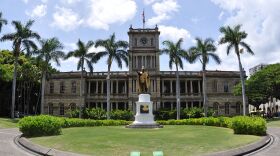Out of the 22 arrests of alleged online predators targeting children on Oahu, only one had a prior criminal record, said Hawaii Attorney General Clare Connors on Monday.
“During the course of our investigations, we learned that many of the individuals who were arrested had engaged in a series of prior crimes that had gone undetected,” she said. "That highlights for all of us the importance of engaging in a coordinated effort to draw out individuals who have up until that point gone undetected."
Twenty-five accused online predators targeting children were arrested in 2019 through Keiki Shield, a joint project of state, federal and county law enforcement agencies in Hawaii.
In 2019, the taskforce conducted three operations, two on Oahu and one on Kauai.
The Oahu operation in March resulted in 12 arrests and the May operation resulted in 10 arrests. The Kauai operation in November concluded over the weekend, resulting in three arrests.
Two of those arrested in Oahu probe in May pleaded guilty and are being handled by the Navy. A spokesperson from the Naval Criminal Investigative Service confirmed that both were in the Navy.
In the same probe, a spokesperson from the state Attorney General's office said, the Army had three court martials that resulted in two convictions and one guilty plea.
"The military is like any other segment of society for the most part," said Norman Dominesey, special agent in charge with NCIS. "We are purely looking for a Department of Navy nexus and that nexus could be a civilian who may or may not work for the Department of the Navy, or it could be an active-duty military member."
Nationally, the number of children targeted by online predators is not decreasing, said John Tobon, special agent in charge with the Department of Homeland Security. Between fiscal year 2018 and 2019, there was an 18 percent increase in the arrests of child predators.
“Generally, what exposes children to the risk is being able to be reached on whatever social media platform,” he said. “So, if you have a child and your child is on one of these sites, and you don't have the security settings, that means everything that they post is available to everybody who has that app. That is what creates the risk.”
Law enforcement officers pose as children online, mimicking characteristics using national and local data to see why particular children are chosen by the predators.
“We sort of reverse-engineer their tactics against them,” said Tobon.
After the suspected individual requests sexual favors, they are met by a law enforcement officer. The fastest arrest from initial contact with the predator was 25 minutes, he said.
Tobon said childhood abuse is the number one indicator that a child will be more susceptible to human trafficking later in life.
“The victimization of children that are abused by these types of predators does not stop when that predator is arrested,” he said. “Nothing happens in a bubble, everything is related.”
“We have worked with a lot of the partners, nonprofits, business groups, and that [abuse and trafficking] is ... completely tied together,” Connors said. “We understand that these correlations are what requires this kind of coordination across all different law enforcement counterparts as well.”
Connors encouraged the public to send any tips about crimes against children to the Hawaii Internet Crimes Against Children Task Force website.
Connors said Keiki Shield operations are intended to continue for more years and could extend to other neighboring islands, including Hawaii Island.




